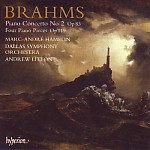Marc-André Hamelin’s forays into the standard repertoire have met with mixed success, partly because the competition is so strong, and partly because there seems to be an assumption that a keyboard technician of Hamelin’s stripe must necessarily come up short when facing less overtly virtuosic, more purely expressive (or intellectual, depending on your perspective) challenges. Certainly Brahms’ Second piano concerto and late piano pieces fall into this latter category. For all of their considerable technical difficulties, they never draw attention to themselves as mere keyboard showmanship, and happily Hamelin rises to their challenges with admirable success. It would be difficult to imagine anyone taking exception to these performances on purely interpretive grounds. Both Hamelin and Litton bring the music to life in a remarkably complete and refreshing way.
In comparing recordings, timings never tell the whole story, but in some works they can be a significant indicator of what to expect. Brahms’ Second concerto certainly is one such piece: any performance lasting longer than 50 minutes or so is likely to be problematic. Hamelin and Litton take about 46 minutes, virtually identical to the Richter/Leinsdorf reference version listed above. Of course, there are differences: this newcomer is a touch slower in the opening allegro and a hair quicker in the slow movement (which features a particularly lovely cello solo). But in both cases the music surges forward as it must. The moment the orchestra bursts out with its first big tutti you can sense that all will be well, and in fact the entire first movement flows effortlessly, with plenty of ear-catching detail along the way.
The second big challenge is the scherzo, an extremely difficult piece to balance thanks to the thick piano writing pitted against dark scoring for lower strings. Hamelin attacks the movement with plenty of passion. Litton responds in kind with some of the most sharply rhythmic (but always unaffected) phrasing that the music has received on disc. The result has exactly the right kind of tension, a fierce energy that never turns hysterical or loses focus. As already suggested, this slow movement is one of the swifter ones, all to the good in my book. The music has to sing, and in Hamelin’s hands it certainly does. He’s very sensitive here to his surroundings–the interplay between soloist and orchestra is just lovely, as well as impeccably sustained.
If there is one controversial aspect to this performance it concerns the main theme of the finale, which Hamelin plays with an almost pointillist staccato articulation that recalls the middle movement of the Saint-Saëns Second concerto. This doesn’t bother me for three reasons: first, I love the Saint-Saëns Second concerto; second, it gives the music a light and fantastical character quite removed from the usual Viennese salon-style approach; third, it represents a legitimate personal view of the music. But I certainly could understand some listeners preferring a more natural, less self-conscious approach, even if Hamelin consistently beguiles the ear and certainly never sounds lazy or merely slack, as you find in so many other versions.
I have no qualms at all about Hamelin’s sensitive and probing take on the Op. 119 piano pieces. Note particularly how, as in the scherzo of the concerto, he uses clean rhythm to bring excitement to No. 3 without overwhelming the music. His light touch in the first piece emphasizes both its dreaminess as well as its sparse modernity: Schoenberg’s famous appellation “Brahms the progressive” is singularly applicable here. The engineering is up to Hyperion’s usual high standard, with ideal balances between piano and orchestra in the concerto. There’s a hint of “twang” to Hamelin’s tone, which is as much attributable to his particular sonority as to the engineering itself. The live audience is very quiet, and most importantly the sense of occasion is palpable. This is an excellent release and an important landmark in Hamelin’s evolving discography.
































